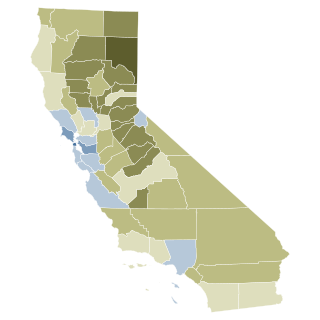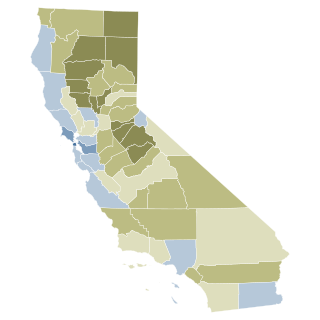
Proposition 13 is an amendment of the Constitution of California enacted during 1978, by means of the initiative process. The initiative was approved by California voters on June 6, 1978. It was upheld as constitutional by the United States Supreme Court in the case of Nordlinger v. Hahn, 505 U.S. 1 (1992). Proposition 13 is embodied in Article XIII A of the Constitution of the State of California.

Fiona Ma is an American accountant and politician. She has been serving as the California state treasurer since January 7, 2019. She previously served as a member of the California Board of Equalization from 2015 to 2019, the California State Assembly (2006–2012), and the San Francisco Board of Supervisors (2002–2006).

Proposition 61 was a California ballot proposition on the November 2, 2004 ballot. It passed with 6,629,095 (58.3%) votes in favor and 4,750,309 (41.7%) against. The proposition was the result of an initiative and authorized the sale of $750 million in bonds to provide funding for children's hospitals. It was officially known as the Children's Hospital Bond Act of 2004.

California Proposition 81 was a ballot initiative on the ballot for California voters in the primary election of June 6, 2006. As SB 1161, it passed through the Senate 28-9 and the Assembly 57–15. On the ballot, it did not pass, having received 1,873,147 (47%) votes in favor and 2,110,132 (53%) votes against.

Proposition 218 is an adopted initiative constitutional amendment which revolutionized local and regional government finance and taxation in California. Named the "Right to Vote on Taxes Act," it was sponsored by the Howard Jarvis Taxpayers Association as a constitutional follow-up to the landmark property tax reduction initiative constitutional amendment, Proposition 13, approved in 1978. Proposition 218 was approved and adopted by California voters during the November 5, 1996, statewide general election.

The 2007 Texas Constitutional Amendment Election took place 6 November 2007.

Proposition 4, or the Abortion Waiting Period and Parental Notification Initiative, also known to its supporters as Sarah's Law, was an initiative state constitutional amendment in the 2008 California general election.

California Proposition 6, also known as the Safe Neighborhoods Act and The Runner Initiative, is a statutory initiative that appeared on the November 2008 ballot in California. This proposition was rejected by voters on November 4 of that year.

California's state elections were held November 3, 1992. Necessary primary elections were held on March 3. Up for election were all the seats of the State Assembly, 20 seats of the State Senate, and fifteen ballot measures.

Proposition 3 is a law that was enacted by California voters by means of the initiative process. It is a bond issue that authorizes $980 million in bonds, to be repaid from state's General Fund, to fund the construction, expansion, remodeling, renovation, furnishing and equipping of children's hospitals. The annual payment on the debt authorized by the initiative is approximately $64 million a year. Altogether, the measure would cost about $1.9 billion over 30 years out of California's general fund.

California Proposition 7, would have required California utilities to procure half of their power from renewable resources by 2025. In order to make that goal, levels of production of solar, wind and other renewable energy resources would more than quadruple from their current output of 10.9%. It would also require California utilities to increase their purchase of electricity generated from renewable resources by 2% annually to meet Renewable Portfolio Standard (RPS) requirements of 40% in 2020 and 50% in 2025. Current law AB32 requires an RPS of 20% by 2010.

California Proposition 10, also known as the California Alternative Fuels Initiative, was an unsuccessful initiated state statute that appeared on the November 2008 ballot in California. Proposition 10 was funded by Clean Energy Fuels Corp., a corporation owned by T. Boone Pickens. Clean Energy Fuels Corp. is the nation's leading operator of natural gas vehicle fueling stations.

Proposition 16 in the California state elections, June 2010, was an initiative that would have amended the state constitution to require two-thirds supermajority voter approval before local governments could use public funds or issue bonds to establish or expand public electricity service or community choice aggregation. The proposition was rejected by an approximate 5 point margin.

In California state elections, 2014 was the first year in which the top statewide offices were elected under the nonpartisan blanket primary, pursuant to Proposition 14, which passed with 53% voter approval in June 2010. Under this system, which first went into effect during the 2012 election year, all candidates will appear on the same ballot, regardless of party. In the primary, voters may vote for any candidate, regardless of their party affiliation. The top two finishers, regardless of party, then advance to face each other in the general election in November.

California state elections in 2018 were held on Tuesday, November 6, 2018, with the primary elections being held on June 5, 2018. Voters elected one member to the United States Senate, 53 members to the United States House of Representatives, all eight state constitutional offices, all four members to the Board of Equalization, 20 members to the California State Senate, and all 80 members to the California State Assembly, among other elected offices.

Proposition 13 was a failed California ballot proposition on the March 3, 2020, ballot that would have authorized the issuance of $15 billion in bonds to finance capital improvements for public and charter schools statewide. The proposition would have also raised the borrowing limit for some school districts and eliminated school impact fees for multifamily housing near transit stations.

California Proposition 15 was a failed citizen-initiated proposition on the November 3, 2020, ballot. It would have provided $6.5 billion to $11.5 billion in new funding for public schools, community colleges, and local government services by creating a "split roll" system that increased taxes on large commercial properties by assessing them at market value, without changing property taxes for small business owners or residential properties for homeowners or renters. The measure failed by a small margin of about four percentage points.

California Proposition 14 is a citizen-initiated ballot measure that appeared on the ballot in the 2020 California elections, for November 3, 2020. It authorizes state bonds to be issued worth $5.5 billion, which will fund the California Institute for Regenerative Medicine (CIRM), which serves as the state's center for stem cell research, and enable it to continue its operations. This measure passed with 51% of the vote.

California Proposition 19 (2020), also referred to as Assembly Constitutional Amendment No. 11, is an amendment of the Constitution of California that was narrowly approved by voters in the general election on November 3, 2020, with just over 51% of the vote. The legislation increases the property tax burden on owners of inherited property to provide expanded property tax benefits to homeowners ages 55 years and older, disabled homeowners, and victims of natural disasters and fund wildfire response. According to the California Legislative Analyst, Proposition 19 is a large net tax increase "of hundreds of millions of dollars per year."









